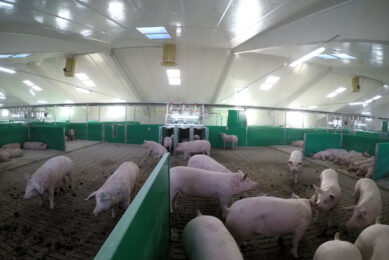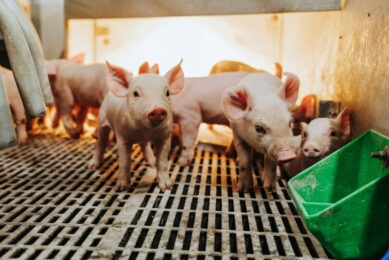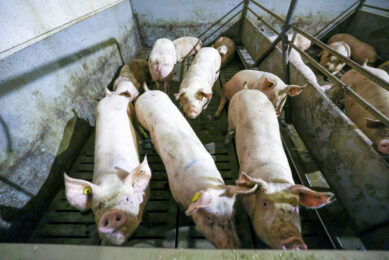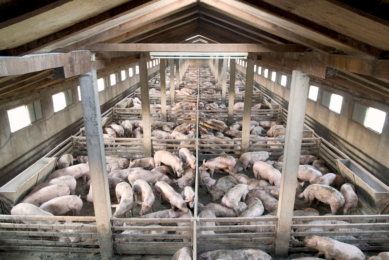Rosalía: A severe challenge for Spain’s pig industry
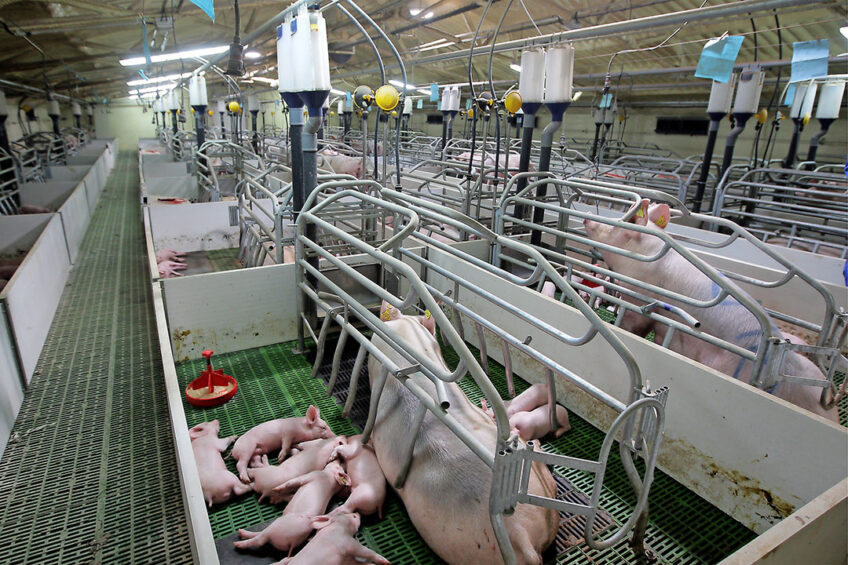
For 2 years already, a new variety of Porcine Reproductive and Respiratory Syndrome (PRRS) has been going around in Spain. It causes more problems than earlier strains of PRRS did. And the end of the “Rosalía” strain is not close yet.
For over 30 years, the pig industry has been facing the challenges of PRRS. The virus is known for having various types and varieties, as mutations and recombinations continue to occur. Different variants are stronger or weaker or lead to fewer or more clinical signs. One of the newest family members in the PRRS family is the highly pathogenic variant Rosalía, found in Spain.
PRRS is difficult to control
After decades of experience, the pig industry has learned that PRRS virus is difficult to control. Apart from being volatile, the virus knows how to manipulate the immune system, as a result of which it takes a long time before an animal can overcome the virus by itself. In addition, the high pig density and the large degree of spread inside the pig population make it extra hard to fight the virus. That is why various types and varieties of PRRSv can be found all around the world, in many pig farms.
1-4-4 strain in the US
Spain is not the only country reporting a relatively novel PRRS variety; in the USA the 1-4-4 strain has been causing much bigger problems on farms than earlier subtypes of the virus have. Even more specifically, the 1-4-4 lineage 1C strain was found to be the main culprit. In addition, about ten years ago in Belarus the Lena variant emerged, and in China highly pathogenic variants have also been described.
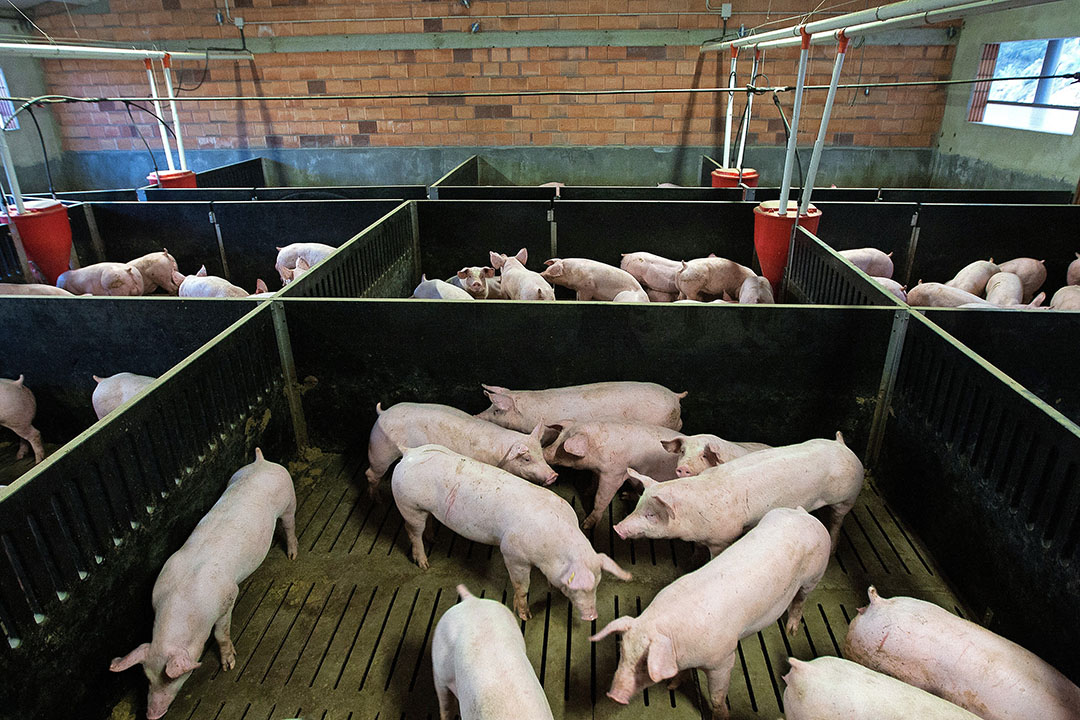
Rosalía: a combination of types
In the PRRS family there are 2 types: the European subtype (type 1) and the American subtype (type 2). The European subtype is milder for the lungs of piglets and finishers than its American counterpart. Problems with sows, for example premature farrowing or weak piglets, are similar with both types.
Within these types there are many variants, because the virus continues to mutate and recombine. Spanish research on Rosalía shows that it consists of four different PRRSv variants. By far the lion’s share is derived from the Italian PR40-variant, which was found in 2014. This variant is highly pathogenic and produces similar clinical signs to Rosalía. Remarkably, a small fraction of a Korean variant was also found. A veterinarian eventually named Rosalia after a Spanish singer.
Severe results
The situation in Spain is grave, says David Llopart, technical expert for pharmaceutical company Hipra, based in Spain. He describes the new variant as highly pathogenic with a higher incidence of mortality and abortion cases with sows, more stillborn piglets and higher mortality rates among piglets and finishers than with earlier PRRS varieties. “On-farm we see 10–30% higher mortality rates in weaned piglets. Mortality rates with sows are 5–10% higher.”
Return to stability only after 6 months
In certain areas, the share of PRRS instable farms has grown from 12% to almost 40%. Usually, a return to a more stable situation occurs by several months after an outbreak, but with Rosalía that only happens after half a year. And the problems aren’t over even then; as the highly pathogenic virus mutates relatively quickly, a new infection can break through newly acquired immunity within a year, for example. Llopart says, “The problem is that the pathogen is a very active virus, spreading many virus particles, which increases the chances of infections inside and outside the farm.”
Difficulty of getting farms stable
The consequences for Spain’s pig industry are large: because of fertility issues as well as the higher mortality rates, piglet production has decreased, allowing other countries in Europe to profit by shipping weaner pigs across the border. Within integrations, damage control is the code word. By applying biosecurity and hygiene regulations, further spread should be limited as much as possible. Easier said than done, Llopart emphasises.
The majority of Rosalía-related outbreaks occur in the pig-intensive areas around the cities Lérida and Zaragoza, in the northeast of Spain in the autonomous communities Catalonia and Aragón respectively. Problems related to fertility and piglet mortality are being felt in the market too, as there is a reduced supply of weaner pigs.
Vaccines help partially
According to Llopart, controlling Rosalía is no different from controlling other PRRS variants. A number of important measures are included in the framework. The hard part is proper adaptation and possible vaccination of gilts. The introduction of gilts is known to be one of the main reasons for destabilising the PRRS situation on farms. The best strategy depends on whether or not gilts have been in contact with the field virus. In any case, Rosalía creates more losses, and more gilts have to be purchased to avoid gaps in the schedule.
Vaccines are a tool in the fight against PRRS. Vaccination is aimed at obtaining maximum immune animals that shed little or no virus. In addition, vaccination reduces the problems in the event of an outbreak. According to Llopart, the current PRRS vaccines also work against Rosalia but, as with other variants, it is never the solution. It has only a small effect, especially for companies with serious problems.
Wider application of vaccines
In theory, it is possible to base vaccines more on this variant, but it will take years before these are ready – and by then the virus will have changed again. Llopart hopes that a new generation of vaccines that are still in the research phase will have wider application. Then new, future variants can also be better combatted.
According to Llopart, 2 aspects are decisive in preventing spread: transport and air. However, air is barely filtered at conventional companies. To limit the risk of spread via transport, he sees opportunities for heat-drying systems for trucks. “Ordinary hygiene rules during transport are insufficient to completely prevent the spread of PRRS.” He therefore urges the Netherlands to be very careful with transport movements between Spain and the Netherlands.
We know that in a world with many contacts, viruses spread easily; corona is the best example in that regard
Karlijn Eenink, pig veterinarian at the Netherlands animal health service Royal GD
Real chance of further spread
The Rosalia variant has not yet been found outside of Spain. No European monitoring is taking place, but health services in other countries do exchange information. It is a given that these and other PRRS variants will spread across Europe. Karlijn Eenink is a pig veterinarian at the Netherlands animal health service Royal GD. She says, “We know that in a world with many contacts, viruses spread easily; corona is the best example in that regard.” It is not clear exactly how the different variants of PRRS are spread.
Eenink does not rule out the possibility that new variants may also appear elsewhere in Europe; after all, that can happen in every pig herd where virus circulates. The chance that a comparable variant with the same genetic background as Rosalia will arise spontaneously elsewhere, however, is very unlikely. She emphasises the importance of respecting biosecurity and hygiene protocols, saying: “There are always sensitive animals on the farm. As long as the virus can circulate, that remains a risk.”



